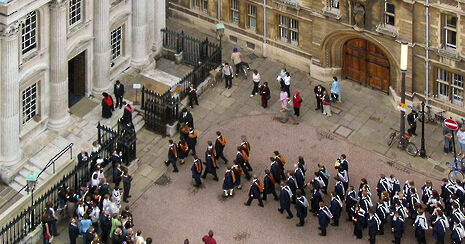New prize for Tripos toppers announced
After a £1.4 million windfall, the Winifred Georgina Holgate Pollard Memorial Prize Fund will open next year

The University of Cambridge is set to create a new prize fund to reward those who achieve the “most outstanding results” in their Tripos, it has been announced.
The fund, which will be called the Winifred Georgina Holgate Pollard Memorial Prize Fund, will be established from 1st October 2016. It comes after the University received a £1.4 million bequest from an alumnus, which was recorded in the Cambridge University Reporter.
Money from the fund will be will be used to award Winifred Georgina Holgate Pollard Memorial Prizes to “the candidate or candidates whom the Examiners of each Tripos Part or Equivalent consider to have achieved the most outstanding results”.
The University expects that the “real value” of the fund will be able to be maintained “in perpetuity”, with money being added over time.
The names of recipients will be published in the Reporter, and will also receive a certificate alongside an as-yet-unannounced monetary sum. The value of the cash prize may vary between Tripos Parts.
The announcement would appear to offer a way for certain Cambridge traditions, which were threatened and supposed extinct in the face of the university ceasing to publish class lists, to live on, albeit in a changed form.
For instance, the proposed end of public class lists supposedly marked the end for the tradition of the highest achieving Cambridge mathematician being named ‘Senior Wrangler’. However, the publication of the recipients’ names means that the title may continue to be used, either formally or informally.
Many faculties already award those who top the part of the Tripos in which they’ve sat exams, with a plethora of other paper-specific or dissertation-specific prizes also up for grabs.
Colleges also maintain funds to reward academic achievement. Students at Downing College, to cite just one example, can expect to be rewarded from one of the 22 funds the college has to give financial prizes to “scholars” who attain first-class honours in their exams.
 News / Reform candidate retracts claim of being Cambridge alum 26 January 2026
News / Reform candidate retracts claim of being Cambridge alum 26 January 2026 Interviews / Lord Leggatt on becoming a Supreme Court Justice21 January 2026
Interviews / Lord Leggatt on becoming a Supreme Court Justice21 January 2026 News / Report suggests Cambridge the hardest place to get a first in the country23 January 2026
News / Report suggests Cambridge the hardest place to get a first in the country23 January 2026 Comment / How Cambridge Made Me Lose My Faith26 January 2026
Comment / How Cambridge Made Me Lose My Faith26 January 2026 Features / Are you more yourself at Cambridge or away from it? 27 January 2026
Features / Are you more yourself at Cambridge or away from it? 27 January 2026








